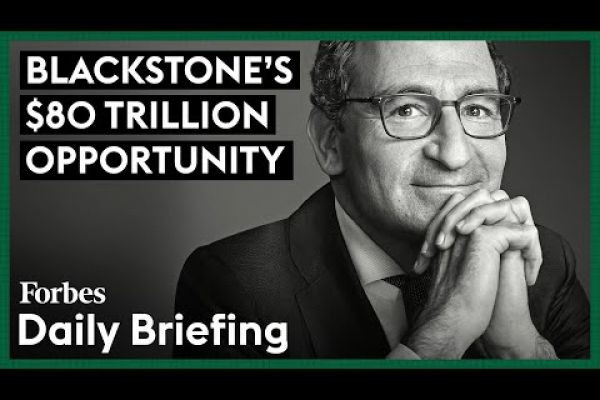Blackstone, the world's largest private equity firm, is seizing the opportunity in the global market of private assets, estimated to be worth $80 trillion. While institutional investors in the US have already allocated a significant portion of their investments to private equity funds, the global market remains relatively untapped. Blackstone is taking advantage of this by expanding its operations worldwide.
Blackstone's European Whirlwind
Blackstone's founder and CEO, Steve Schwarzman, is currently in Europe, where the firm has been swiftly opening new offices. After opening a 14,000 square foot office in Frankfurt, Germany, Blackstone inaugurated a 26,000 square foot office in Paris, France. Schwarzman and his team are focusing on strengthening relationships with European investors and family offices, recognizing the potential for growth in the continent.
The Importance of India's Growing Market
Jonathan Gray, Blackstone's President and COO, has been traveling extensively to ensure the firm's continued success. While Schwarzman was in Paris, Gray was en route to Toronto, where Blackstone is opening its first office in Canada. Additionally, he has plans to visit Blackstone's Singapore office, which is expected to double its headcount over the next two years. Gray understands the importance of India's market, where Blackstone owns a significant number of companies and is the largest commercial real estate operator.
The Changing Landscape of Private Equity
Blackstone recognizes that the traditional leveraged buyout game, which involves acquiring struggling companies, cutting costs, and quickly selling them for a profit, is losing traction. Instead, the new trend in private equity, referred to as "Alternatives," involves acquiring companies in growth industries and expanding them. Blackstone is at the forefront of this shift, aiming to become the world's largest full-service capital provider.
The Rise of Perpetual Funds
One key development in the private equity industry is the rise of perpetual funds. Unlike traditional funds with limited lifespans, perpetual funds have no end date and allow individual investors to easily redeem their investments. Blackstone has embraced this model, with perpetual funds now accounting for 38% of the firm's $1 trillion in assets under management. This strategic move has helped Blackstone secure a significant share of the perpetual fund market, challenging established banking giants like JP Morgan, BNP Paribas, and HSBC.
In conclusion, Blackstone's international expansion and focus on growth-oriented private assets demonstrate the firm's commitment to reshaping the private equity industry. With the rise of perpetual funds and the untapped potential of the global market, Blackstone is poised to remain a dominant force in the ever-evolving world of finance.
 Bitcoin: $97554.88 1.63%
Bitcoin: $97554.88 1.63%  Ethereum: $3409.95 2.74%
Ethereum: $3409.95 2.74%  Tether: $1.00 0%
Tether: $1.00 0%  Solana: $256.33 0.16%
Solana: $256.33 0.16%  BNB: $653.20 4.42%
BNB: $653.20 4.42%  XRP: $1.46 0.75%
XRP: $1.46 0.75%  Dogecoin: $0.43 3.23%
Dogecoin: $0.43 3.23%  USDC: $1.00 0.05%
USDC: $1.00 0.05%  Cardano: $1.04 6.7%
Cardano: $1.04 6.7%  Lido Staked ETH: $3389.33 2.77%
Lido Staked ETH: $3389.33 2.77%  TRON: $0.21 6.43%
TRON: $0.21 6.43%  Avalanche: $41.90 6.41%
Avalanche: $41.90 6.41%  Stellar: $0.51 67.38%
Stellar: $0.51 67.38%  Shiba Inu: $0.00 2.06%
Shiba Inu: $0.00 2.06%  Wrapped Bitcoin: $97396.27 1.53%
Wrapped Bitcoin: $97396.27 1.53%  Polkadot: $8.49 34.45%
Polkadot: $8.49 34.45%  Chainlink: $17.37 11.04%
Chainlink: $17.37 11.04%  Bitcoin Cash: $506.79 3.49%
Bitcoin Cash: $506.79 3.49%  UNUS SED LEO: $8.61 1.58%
UNUS SED LEO: $8.61 1.58%  NEAR Protocol: $6.15 7.57%
NEAR Protocol: $6.15 7.57%  Litecoin: $98.29 8.59%
Litecoin: $98.29 8.59%  Uniswap: $10.82 13.88%
Uniswap: $10.82 13.88%  Internet Computer: $11.36 10.76%
Internet Computer: $11.36 10.76%  Multi Collateral DAI: $1.00 0.06%
Multi Collateral DAI: $1.00 0.06%  Crypto.com Coin: $0.19 3.01%
Crypto.com Coin: $0.19 3.01%  Sp8de: $0.59 12.98%
Sp8de: $0.59 12.98%  Ethereum Classic: $29.61 5.68%
Ethereum Classic: $29.61 5.68%  Artificial Superintelligence Alliance: $1.38 11.1%
Artificial Superintelligence Alliance: $1.38 11.1%  VeChain: $0.04 25.36%
VeChain: $0.04 25.36%  Filecoin: $5.42 14.25%
Filecoin: $5.42 14.25%  Stacks: $2.09 5.42%
Stacks: $2.09 5.42%  OKB: $50.42 9.55%
OKB: $50.42 9.55%  Monero: $160.11 0.74%
Monero: $160.11 0.74%  Aave: $175.81 6.04%
Aave: $175.81 6.04%  Algorand: $0.30 20.78%
Algorand: $0.30 20.78%  Fantom: $0.88 20.79%
Fantom: $0.88 20.79%  The Graph: $0.24 10.31%
The Graph: $0.24 10.31%  Hedera Hashgraph: $0.15 9.91%
Hedera Hashgraph: $0.15 9.91%  Injective: $27.88 12.86%
Injective: $27.88 12.86%  Cosmos: $8.12 10.29%
Cosmos: $8.12 10.29%  THORChain: $5.62 5.64%
THORChain: $5.62 5.64%  THETA: $1.90 11.47%
THETA: $1.90 11.47%  MANTRA DAO: $3.64 0.58%
MANTRA DAO: $3.64 0.58%  Raydium: $6.08 0.15%
Raydium: $6.08 0.15%  Maker: $1650.73 0.43%
Maker: $1650.73 0.43%  Arweave: $22.10 24.46%
Arweave: $22.10 24.46%  Bitcoin SV: $70.13 3.11%
Bitcoin SV: $70.13 3.11%  KuCoin Token: $11.40 2.95%
KuCoin Token: $11.40 2.95%  Polygon: $0.56 20%
Polygon: $0.56 20%  Flow: $0.83 14.49%
Flow: $0.83 14.49%  Quant: $101.44 17.64%
Quant: $101.44 17.64%  Gala: $0.03 14.92%
Gala: $0.03 14.92%  Lido DAO: $1.34 8.85%
Lido DAO: $1.34 8.85%  EOS: $0.76 6.07%
EOS: $0.76 6.07%  Tezos: $1.13 2.5%
Tezos: $1.13 2.5%  Neo: $14.50 7.88%
Neo: $14.50 7.88%  Axie Infinity: $6.65 11.52%
Axie Infinity: $6.65 11.52%  Decentraland: $0.51 18.41%
Decentraland: $0.51 18.41%  The Sandbox: $0.41 13.9%
The Sandbox: $0.41 13.9%  Helium: $5.74 5.13%
Helium: $5.74 5.13%  GateToken: $10.99 8.24%
GateToken: $10.99 8.24%  Akash Network: $3.92 4.49%
Akash Network: $3.92 4.49%  AIOZ Network: $0.81 11.4%
AIOZ Network: $0.81 11.4%  eCash: $0.00 2.55%
eCash: $0.00 2.55%  Nexo: $1.35 3.03%
Nexo: $1.35 3.03%  Pendle: $5.30 5.15%
Pendle: $5.30 5.15%  MultiversX: $35.80 17.27%
MultiversX: $35.80 17.27%  Mina: $0.72 6.45%
Mina: $0.72 6.45%  FTX Token: $2.52 3.4%
FTX Token: $2.52 3.4%  Conflux: $0.17 9.98%
Conflux: $0.17 9.98%  Zcash: $47.95 5.11%
Zcash: $47.95 5.11%  Chiliz: $0.08 10.79%
Chiliz: $0.08 10.79%  IOTA: $0.22 17.87%
IOTA: $0.22 17.87%  Gnosis: $272.61 4.55%
Gnosis: $272.61 4.55%  Oasis: $0.10 14.11%
Oasis: $0.10 14.11%  Kusama: $42.06 94.3%
Kusama: $42.06 94.3%  XinFin Network: $0.05 15.38%
XinFin Network: $0.05 15.38%  SuperVerse: $1.32 6.82%
SuperVerse: $1.32 6.82%  PancakeSwap: $2.18 10.79%
PancakeSwap: $2.18 10.79%  Nervos Network: $0.01 6.58%
Nervos Network: $0.01 6.58%  Curve DAO Token: $0.50 11.01%
Curve DAO Token: $0.50 11.01%  Compound: $63.98 18.13%
Compound: $63.98 18.13%  Kava: $0.49 6.24%
Kava: $0.49 6.24%  TrueUSD: $1.00 0.05%
TrueUSD: $1.00 0.05%  NXM: $73.42 4.86%
NXM: $73.42 4.86%  Theta Fuel: $0.07 4.44%
Theta Fuel: $0.07 4.44%  DeXe: $8.28 0.88%
DeXe: $8.28 0.88%  1inch Network: $0.36 5.91%
1inch Network: $0.36 5.91%  Synthetix: $1.99 9.34%
Synthetix: $1.99 9.34%  Zilliqa: $0.02 13.96%
Zilliqa: $0.02 13.96%  WOO: $0.24 10.17%
WOO: $0.24 10.17%  Celo: $0.80 9.7%
Celo: $0.80 9.7%  Reserve Rights: $0.01 8.43%
Reserve Rights: $0.01 8.43%  Trust Wallet Token: $1.01 4.6%
Trust Wallet Token: $1.01 4.6%  Livepeer: $11.67 10.6%
Livepeer: $11.67 10.6%  IoTeX: $0.04 4.23%
IoTeX: $0.04 4.23%  Holo: $0.00 10.29%
Holo: $0.00 10.29%  Enjin Coin: $0.23 13.92%
Enjin Coin: $0.23 13.92%  Amp: $0.00 7.22%
Amp: $0.00 7.22%  Dash: $33.01 11.6%
Dash: $33.01 11.6% 







